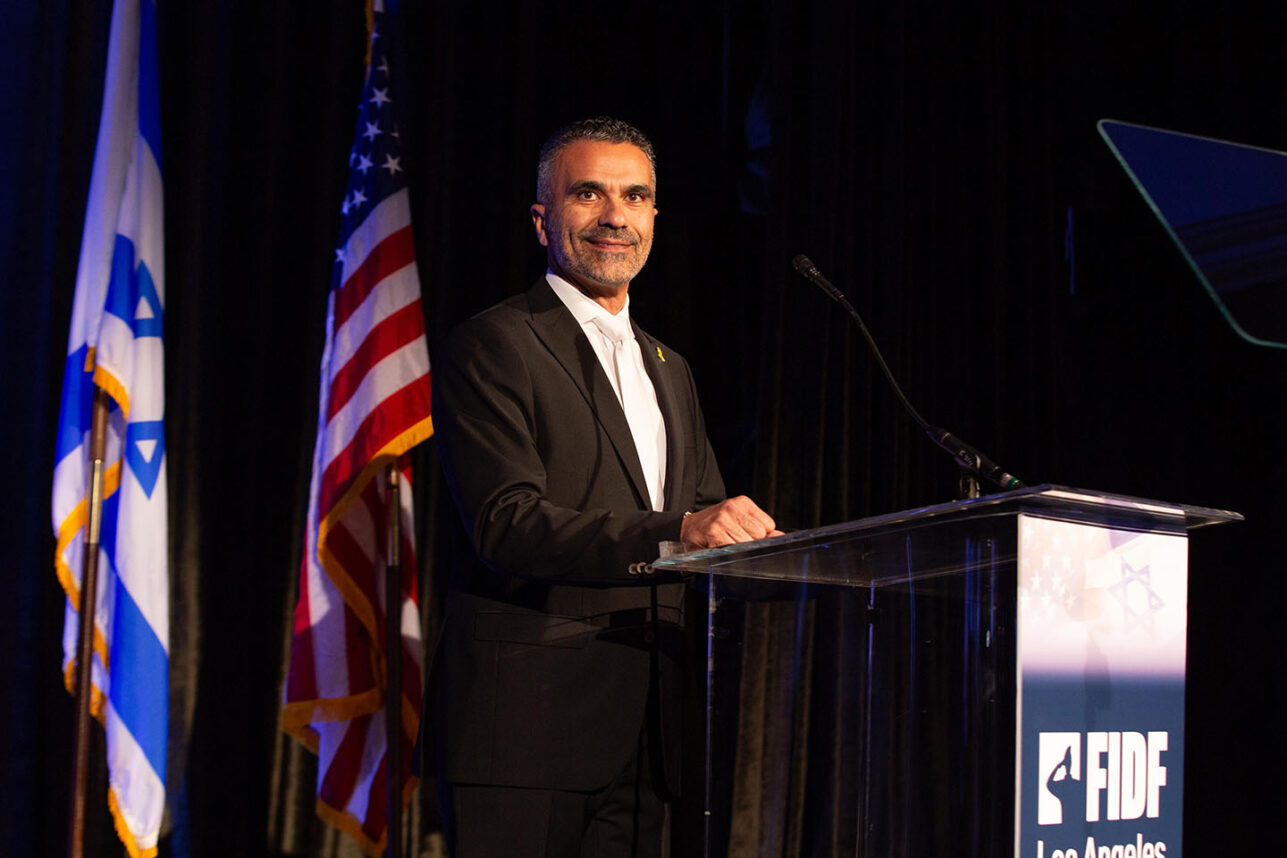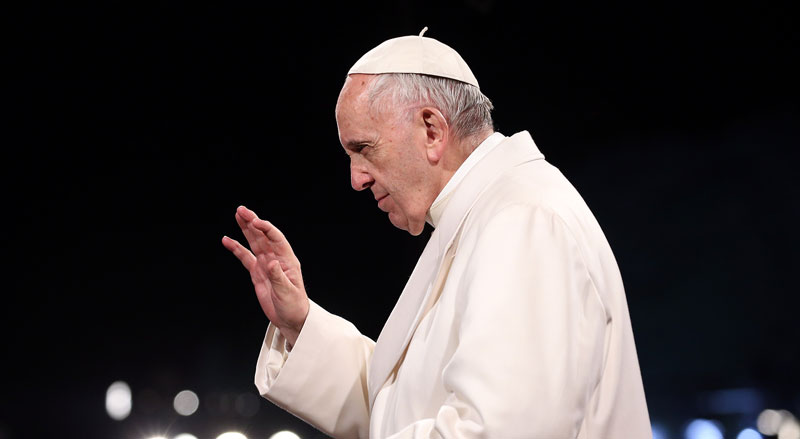Funny how a massive attack on American shores, the devastating loss of 3,000 innocent lives, the U.S. invasion of one country (Afghanistan), the incipient invasion of another (Iraq) and the continued threat of biological, nuclear and random terror in our own neighborhoods can get people thinking.
Ever since Sept. 11, 2001, an ideologically diverse and unallied group of analysts, pundits, activists, business people and the occasional brave politician has been proffering one very simple message for anyone interested in how America can shake free from the grip of Islamic terror: It’s the oil, stupid. “If we can reduce our dependence on oil, and our need to go the extra mile in going along with some of the things that repressive regimes do, we would be a lot better off,” former CIA Director James Woolsey told Reuters. “But to get that kind of independence we have got to be not so dependent on their oil.”
Such sentiments have begun to resonate loudly with Jewish activists and organizations. Buttressed by the research of energy experts such as Amory Lovins, they have concluded that American energy consumption endangers not just American stability, but Israeli security and even what they understand as Jewish values. “The Persian Gulf has 63 percent of the world’s oil reserves, and worldwide consumption is expected to grow 55 percent over the next 20 years,” said Jack Halpern, chairman of the American Jewish Congress (AJCongress) Energy Independence Task Force, in a recent address. “The bitter reality is that the Arabs don’t invest in their peoples’ welfare. Instead, they spend their petrodollars acquiring weapons of mass destruction, distorting the votes and conferences of the United Nations, harboring terror organizations, rewarding the families of suicide bombers and funding the Wahabi madrases that breed radical Islam. In short, Arab oil imposes a suffocating burden on Israel, and is a lethal threat to U.S. citizens.”
If there’s a bit of overkill in the rhetoric — Arab states do spend many of their petrodollars legitimately — the concern over our open-ended account at Gulf State Gas & Electric is real. The AJCongress is just one of the Jewish groups now intent on decoupling the American economy — and Israel’s security — from the West’s dependence on Persian Gulf oil.
Although only about 16 percent of our oil comes from the Gulf, every long-range forecast shows America needing the resources that the Gulf State regimes control — unless we significantly cut our consumption. That need forces us into geopolitical games that, given our addiction, we find impossible to walk away from.
“It really is all about the oil,” said Richard Ziman, CEO of Los Angeles-based Arden Realty, the largest landlord of office buildings in Southern California and the state’s leader in energy-efficient commercial construction. “It dumbfounds me that a country with our technical talent can’t develop a way to get rid of this issue.”
There may not be a technical fix — yet — but there is a growing political pressure for it. A coalition of 29 Jewish environmental groups across the country has launched a multifaceted outreach campaign — including the installation of solar panels on local synagogues — to increase awareness of the impact of energy consumption on national security and environmental policy. “People ask, ‘What can I do for Israel?'” said Lee Wallach, Southern California chair of the Council on the Environment and Jewish Life (COEJL). “Well, one of the things you can do is look at the kind of vehicle you drive.”
On Nov. 20, COEJL and the National Council of Churches launched a national letter-writing campaign to CEOs of automobile companies asking them to raise Corporate Average Fuel Economy standards, the minimum average fuel economy that a manufacturer’s fleet of cars must meet. Along with pressing Ford, General Motors and Chrysler, the 100 religious leaders are calling upon their congregants to weigh fuel efficiency more heavily when they buy a car.
Just this week, COEJL descended on Santa Monica Pier and ticketed gas-guzzling SUV’s with faux citations. “For Jews to be driving these big SUVs that provide billions to Saudi Arabia, Iran and Iraq and make us beholden to these countries is a disaster,” Wallach said. “Now we can make a direct link between war and terror and oil.”
This Chanukah, COEJL began distributing educational packets linking the holiday, with its imagery of burning oil and the miracle of light, to the need for oil conservation. Energy efficiency, said COEJL Director David Rosenstein, is a Jewish moral obligation, the “stewardship of God’s creation.”
Unlike in years past, such sentiments are not solely the province of hemp-wearing men and women with composting toilets. For one, bottom-line capitalists have joined the fray. Acres of advanced photovoltaic panels are in operation on the roofs of the 302,000-square-foot office centerbuilding in Fountain Valley, which is owned by Ziman’s Arden Realty, Inc. This year, Arden earned the federal government’s highest energy efficiency and environmental conservation designation — the “Energy Star” label. Cost was only one factor, Ziman said, in his decision to invest more than $20 million in energy retrofits this year — the biggest variables in commercial real estate development are wages and utilities. The other factor was geopolitical. “I’ve always been concerned about our dependence on foreign oil,” he said.
Ziman is an unabashed liberal. But his concerns are echoed across the political spectrum, all the way to the Republican Jewish Coalition and former Speaker of the House Newt Gingrich, who will chair AJCongress’ first ever Cooperation for Energy Independence of Democracies in the 21st Century held in Jerusalem from Jan. 21-23, 2003. The debate might be over solutions — whether drilling in the Arctic National Wildlife Refuge will decrease our oil dependence substantially or not at all, for instance — but not over the basic problem.
One unlikely prophet to this gathering tribe is Lovins, energy guru extraordinaire. He has been saying what they are saying, but he’s been saying it since 1975. That’s the year he published a landmark article in Foreign Affairs arguing that if the market were allowed to pick the cheapest way to provide a given use of energy — say a warm house or a cold beer — it would always pick renewable resources or conservation.
Shortly after the Sept. 11 attacks, I spoke with Lovins, who had been my professor for a term in college two decades ago. At the time, Lovins’ research was groundbreaking, but hardly mainstream. Osama bin Laden changed that. Although I had completely lost touch with Lovins, what he taught back then suddenly struck me as painfully relevant.
And, when I reached him by phone, he acknowledged that my instincts were correct. Pursuing energy efficiency, he once again said, would be the fastest way to decrease our addiction to Mideast oil.
Before I could ask the obvious first question, Lovins repeated something he’d found himself telling a lot of journalists lately. During the six years after the 1979 oil embargo, U.S. oil imports from the Persian Gulf fell 87 percent. Lovins referred to those years as, “The last time we were paying attention.” That difference was due, largely, to new fuel-efficiency standards that increased vehicle output by some 7 miles per gallon (mpg). The result: OPEC got the message that the United States could separate our economic health from Persian Gulf oil — gross domestic product grew by 16 percent during the period. In 1986, President Ronald Reagan relaxed vehicle-efficiency standards, and oil imports skyrocketed. “If we had continued at the same pace,” Lovins said, “we’d have needed no Gulf oil by now.”
But that’s not what happened. The advent of the SUV, which has been exempt from new fuel-efficiency standards, has proven catastrophic for efficiency. Today, new cars average 24 mpg, a 20-year low. (Two weeks ago, a Transportation Department study found that the average gas mileage of new vehicles in the 2001 model year had slipped back to the level of 1999, which was the lowest since 1980.)
It is possible, Lovins said, to take OPEC out of the equation again, with the same old tools: efficiency and renewable resources.
Lovins never uses the C word: Conservation was so 1970s. What will set us free from oil dependence, he stressed, is oil efficiency. “There is a stark difference between efficiency and conservation. Conservation is a change in behavior based on the attitude, ‘Do less to use less.’ Efficiency is the application of technologies and best practices to eliminate waste based on the attitude, ‘Do the same or more with less.'” To replace Persian Gulf oil imports, Lovins said, would take a 2.7 mpg increase in the automobile fleet. Making the light vehicle fleet more efficient by 0.4 mpg would save enough gasoline to save as much crude oil as we’ll ever pull out of Arctic National Wildlife Refuge. “In 1991, the United States deployed 0.56-mile-per-gallon Abrams tanks and 17-feet-per-gallon-equivalent aircraft carriers to the Persian Gulf because we hadn’t deployed 32-mpg cars at home,” he said.
Do such voices have a chance of being heard under an administration glutted with oil company executives, focused on war with a major oil-producing nation and eager to expand domestic drilling? Lovins, ever analytical, is cooly apolitical. His Rocky Mountain Institute (RMI), a “think-and-do tank” on energy issues he runs out of an energy-efficient home near Aspen, Colo., spearheaded a non-partisan National Energy Policy Initiative which outlined an alternative to the Bush Adminstration energy program that has found support among Democrats and Republicans.
Doubt him if you will, but Lovins credibility puts him in a league no tree-sitter can match. Admitted to Harvard at age 16, he was named a don in physics at Oxford University at 21. The author of 27 books, he received a MacArthur genius grant, and was named “A Hero for the Planet” by Time. Lovins regularly earns upward of $20,000 per day in consulting fees for major corporations, a source of financing for RMI. (The Web site www.rmi.org is a model of efficiency and design in and of itself.)
“If people had listened to Amory 20 years ago on making the [energy] infrastructure more decentralized and resilient,” ex-CIA director Woolsey told Fortune magazine, “the country would be in a lot less dangerous shape.”
Lovins, instead of doing the I-told-you-so dance, is offering yet more ways out. One, he told me enthusiastically, could involve Israel.
Lovins started Hypercar, Inc. to build an SUV that could go from one end of America to another on a single fill-up and emit nothing but drinkable water. Made of lightweight carbon fiber — think fighter planes and tennis rackets — it would be powered by a fuel cell that cleanly converts hydrogen into electricity. BP Amoco has invested in the Hypercar start-up, and former executives from Shell, Fiat, Jaguar and GM sit on Hypercar’s board of advisers. And there’s room for others to get involved: Lovins asked, if you were to pick a country to develop and manufacture a car that used alternative hydrogen fuel cell technology, light and strong materials often found in military aircraft manufacture, and relied on an educated and motivated workforce, which country would you choose? “Israel,” he said.
And indeed, part of the AJCongress conference in Jerusalem this January will be devoted to involving Israel in the Department of Energy’s “Freedom-Car” initiative, a $150 million-a-year program aimed at improving gas-electric hybrid cars and developing cars running on hydrogen, which use zero gasoline.
That Lovins’ words echo in the Jewish state should surprise no one these days. Terrorism, oil policy, national security and Israel have become inextricably linked since Sept. 11, 2001, and the people who proclaimed the miracle of the oil, celebrated every year at this time, are now hoping to have to burn, buy and be beholden to much, much less of it.























 More news and opinions than at a Shabbat dinner, right in your inbox.
More news and opinions than at a Shabbat dinner, right in your inbox.